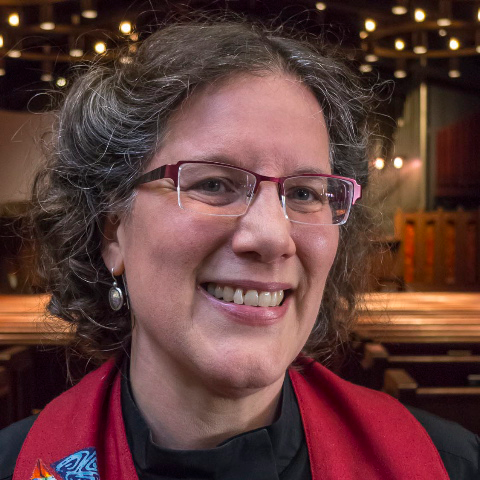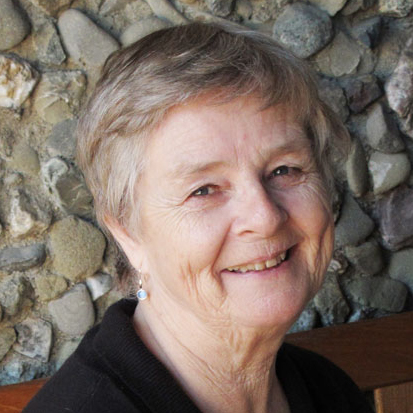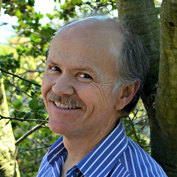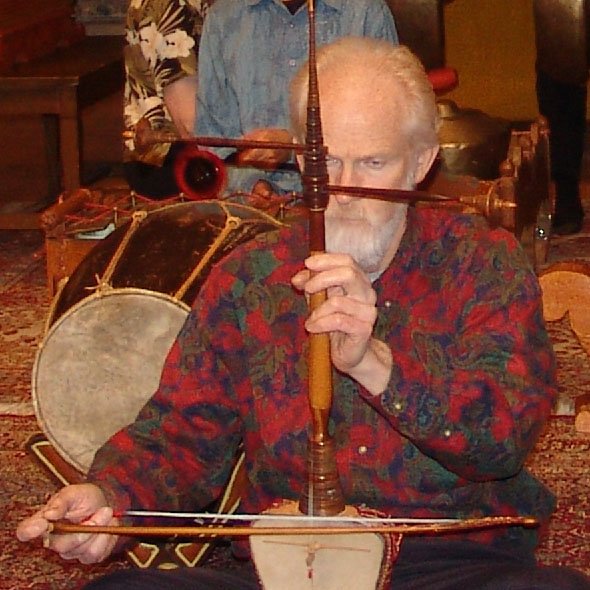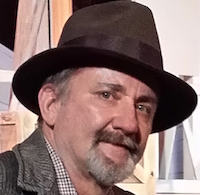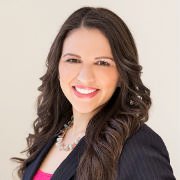Edward B. Payne, 1892–1897
In 1891 the AUA—American Unitarian Association—offered to contribute $1,000 toward a minister’s salary for the first year. However, they meant it to be $500 for a minister’s salary, and $500 salary for the proposed seminary. The church had found its own minister, and insisted on the full sum. With $500 from the Pacific Unitarian Conference and $500 from the church, the first minister’s salary was a workable $2000. Relations with the AUA were deeply wounded and actually severed for a time. The congregation loved Payne, were fiercely loyal to him, and he did a thoroughly satisfactory job. Plans for a church building were started. He resigned during the first half of 1897 “to write.” The panic of 1893 stalled Boston’s yearning for a seminary.
William B. Geoghegan, 1897–1899
Rev. Geohegan came from the East, described as a “gentleman of broad culture” and highly recommended as a preacher of more than ordinary force and eloquence. The new church building was dedicated in 1898, and though Geoghegan only stayed for two years, the building was dedicated to him.
Frederick L. Hosmer, 1900–1904
Rev. Hosmer had retired to Berkeley, volunteered to be interim minister, and was persuaded to continue, with the understanding that his duties would be limited. He was held in greatest esteem as a scholar, poet, hymnologist, and gentle soul. He had been on the faculty of Harvard lecturing on hymnology—some of his hymns are in our hymnal today. He started the tradition of fine music in the church with the installation of an organ, a twin to the one in the chapel at Stanford University.
John Howland Lathrop, 1905–1911
Rev. Lathrop, a graduating senior from Harvard, came with the personal recommendation of the President of the AUA. Since his experience was limited, he had a starting salary of $1,500. During his ministry the church provided help for the refugees from the San Francisco earthquake and fire, bedding them in the pews and providing food. In 1907 Dr. Lathrop was married to the church soloist Lita Schlesinger, breaking hearts in the congregation and all over Berkeley. Money was borrowed to purchase the house next door, which became the Parish House. Parish Hall was completed under the direction of its designer, Dr. Bernard Maybeck, whose fellow architect had designed the church building.
Arthur Maxson Smith, 1911–1915
Rev. Smith was known as a “gentle soul,” handsome and lovable. He left for reasons of ill health. During his time the Board decided to dispense with collection plates. Boxes would be placed at the rear of the church. Collections fell considerably. Boxes were moved to a more prominent position. They were broken into, and into pieces. The church went back to plates.
Harrold Edwin Balmer Speight, 1915–1921
Rev. Speight came from Vancouver, Canada, was called “Spaytie” by the young men whom he accompanied on outings to Inverness. At the end of his first 10 months he reported that he had made 435 calls, finding 309 people at home. The church hired the first custodian to live on the premises, and a Religious Education Director, at $60 a year. Speight wanted to change the church’s name to Unity Church and add some sacraments, but the proposals failed. During the war he became Chair of Berkeley’s Red Cross Chapter, and he started organizing chapters all about. Bandages were rolled, sewing and knitting were done, and the church sent $100 a year to Homorodujfalu in Transylvania. Speight was hired away from us by King’s Chapel in Boston.
Robert F. Leavens, 1922–1925
Dr. Leavens came from Omaha on a six-month trial basis and stayed. A lay assistant was hired as well as a secretary, custodian, gardener, publicity person, and record keeper at $100 a month. A “Preaching Mission,” eight meetings in seven days, drew large crowds to the Oakland Auditorium, but there were no increases in the membership book signings. A group of young people built a cabin at Inverness on land owned by a member, later given to the church.
Elred C. Vanderlaan, 1925–1932
Rev. Vanderlaan was a good speaker, a well-known humanist and a socialist, but his intellectual sermons were not inspiring enough to keep the congregation coming to church. In September 1928, although speculation had been rife, the Board discussed the possible future plans of the University in acquiring property in this block because of recent acquisitions in the vicinity—the first direct action about our church’s moving.As the Great Depression deepened, his seminary salary was stopped, and the church finances struggled. Should we have an every-member canvass? We had no financial difficulties the two years we did that. “I am in favor of it if I am not called upon to do the canvassing.”
The church was without a minister for a full year in 1933. Notables spoke to audiences of 500 to 600, but net proceeds were $50.58.
Horace Westwood, 1934–1945
Dr. Westwood had ideas to burn: he wanted an atmosphere of worship, definite objectives, young people attending services, and wanted to make the church the “cathedral church” of the area. There was a war, and orthodox churches became more liberal, more competitive. It was felt the Westwood was not in tune with the times, that he did not understand young people, nor they him. Dr. Westwood felt a lack of churchmanship on the part of the majority of the congregation, an “audience” psychology rather than a “congregation” psychology. Church attendance depended on the subject matter implied in the sermon topic, rather than attendance based upon the desire for fellowship and a feeling of abiding loyalty to the ideals and purposes the church exists to serve. To put it another way, “we really have to re-establish confidence in ourselves as a church and remove the reproach that we are an academy of skeptics governed by our respective radicalisms.”
He left for Charleston, South Carolina and a new letterhead: “The Cathedral Church of the South.”
(The above notes were written by Maizie Newman.)
J. Raymond Cope, 1946–1968
Dr. Cope received his AB in 1927 from the Franklin College in Indiana, did his graduate work at Ohio State University 1927 to 1929 in philosophy and psychology, and Harvard University 1929 to 1932 under Whitehead. He received his PhD at Ohio State in 1936 in philosophy. He taught at Indiana University from 1938 to 1942, and taught philosophy at the University of Utah from 1942 to 1946. Some of his main interests were counseling and sharing the deep personal experiences of people. These interests became more sharply defined toward the religious aspects of life, and the church’s unique purpose in the life of the individual. His sermons often ended with an expression of joy at living in exciting times. The church’s response to postwar anti-communism efforts by the HUAC, the move up the hill to Kensington, and the creation of the Berkeley Fellowship by some of our members is discussed in other sections of this history.
Francis Randall
Mr. Randall was not a called minister, he was an ordained Congregational Minister, served our church in Dr. Cope’s time as R.E. Director and, after retirement, as Church Custodian. He and his wife Martha were called “Ministers to the Congregation.”
Howard W. Oliver, 1969–1972
Dr. Cope was a difficult act to follow, and the UUA started urging that long-time ministries be followed by an interim ministry. Oliver was in his early 40s, a very kind, likeable, intelligent person whose sermons were excellently conceived and delivered. He was well educated. Two of his three degrees were from the University of Southern California, including his ministerial degree. He had been a chaplain with the military, and director of the actor’s Labor Union in Los Angeles. A spinal condition became severe and eventually resulted in his resignation.
Richard Boeke, 1973–1994
Dr. Boeke was ordained in 1955, served the UU Fellowship in Chico, CA; the UU Fellowship of Northern Nevada in Reno, NV; the UU Church of Flushing, MY; the UU Church of Saint Petersburg, FL; and from 1973 to 1995 the UU Church of Berkeley, CA. Merv Hasselmann’s church history describes him arriving at 42, “married with two small daughters, athletic, educated at Iowa State (B.S. 1957), Yale Divinity School (M. Div) and Columbia (M.A.) plus post-graduate courses at Harvard and Starr King. He was widely read, traveled, well informed in the arts, with a great deal of experience in community and denominational affairs plus a flair for organization (ministerial groups, civil rights groups, church groups). He was even a delegate to the 1958 National Democratic convention. In 1981 he received the annual award for Service to International Liberal Religion from the American chapter of the IARF. While ministering to us he earned his D. Min in 1982 at Pacific School of Religion with a thesis on Faith.
His enthusiastic support of international and face-to-face social action is described in other areas of this history. He retired in 1994, being made Emeritus by the Board of Trustees. He and Jopie moved to England where he became Minister in Horsham, retiring in 2000. In 2010 he was accused of ministerial misconduct. The problem was discussed at length by the congregation and was resolved by his resignation from church membership and Emeritus status.
Stephen H. Furrer, 1981–1982
Rev. Furrer was Interned at the San Francisco Church and ordained in 1979. He was hired as Assistant Minister to Dick Boeke in 1981, and left in 1982 to an active career in ministry acting variously as assistant minister, interim minister, minister, and interim senior minister in various churches. He has said that to be a minister, one must be willing to move. His CV lists churches in eleven cities—really moving.
Holly Elaine Horn, 1986–1991
The Rev. Dr. Holly E. Horn was ordained in 1986; received her PhD from the Graduate Theological Union in 1998; and was Assistant Minister at UUCB 1986–1991, where she charmed the congregation with her poetic skills and sermons. She left to become minister and co-minister in several churches.
Johanna Boeke, 1991–1994
The Rev. Johanna Boeke (Dick Boeke’s wife) was ordained in 1987, was chaplain at Chaparral House in Berkeley, CA and Associate Minister at UUCB 1991–1994. When the Boekes moved to England she became Interim Minister to the Essex Unitarian church, London, and Minister to the Horsham and Goldalming Unitarian churches in Horsham, England. She retired in 2000.
Robert Kaufmann, 1995–1996
Bob Kaufmann was interim minister (not a called minister) after Dr. Boeke retired. He served for a year and a half until Barbara and Bill Hamilton-Holway were called.
Barbara and Bill Hamilton-Holway, 1996–Present
Barbara and Bill Hamilton-Holway were called by our congregation as our co-ministers in 1996. Before coming to our congregation, they served as co-ministers in Salt Lake City, Utah. During this time, they helped expand Unitarian Universalism by serving as Organizing Ministers for congregations forming in Ogden and Park City.
Barbara is a graduate of Starr King School for the Ministry. Before ministry, she did graduate work in literature and for a decade she was a high school English teacher. Barbara also was a teacher as a Peace Corps Volunteer in the Fiji Islands. She is grateful for her years parenting her now grown children Sarah and Ben. Barbara wants her ministry to encourage people to be true to themselves, to be who they can be, and to increase odds on justice and love.
Bill graduated from Meadville/Lombard Theological School and the University of Chicago Divinity School. After graduation, he served as minister of congregations in Texas and worked for the Unitarian Universalist Association in Boston as Director of the Extension Department. During college a significant decision for Bill was registering as a Conscientious Objector. Bill’s family roots in Unitarian Universalism go back many generations. His grandparents were founders of All Souls Unitarian Church in Tulsa and his parents were founders of Hope Unitarian Church in Tulsa. Unitarian Universalism is in his blood. Family, genealogical research, reading, writing, travel, and hiking are among his great loves.
Barbara and Bill like collaboration and team ministry and are grateful to work with the excellent staff and the good congregation of the Unitarian Universalist Church of Berkeley.
Christopher (Craethnenn) Holton Jablonski, 2005–2011
Chris graduated from Starr King in 2004, was ordained in 2005, and was Minister of Religious Education at our church from 2005 to 2011. During Chris’s time at UUCB, he delighted young and old with his enthralling storytelling and supported the re-energizing of the Religious Education and Family Ministry Program. He was called as minister to the Portsmouth NH church in 2012.
Marcus Liefert, Intern Minister 2011–2013
Marcus Liefert was hired as our intern minister for 2011–2012, initially with the thought that his religious education interest would serve well during the sabbatical of Chris Holton Jablonski. When Chris was called to the Portsmouth church, Marcus served together with Family Minister Laura Bogle, together maintaining the strength of the Religious Education and Family Ministry Program. For the period of 2012, Marcus is continuing as Intern Minister, working as a team with Amy Moses-Lagos and Sheri Prud’homme.
Marcus has lived in Berkeley almost all his life, and was raised Unitarian Universalist at the Oakland church. Over the past several years he has been playing, teaching, and learning with children and youth of all ages in almost any setting you can imagine—camps, schools, churches, museums, you name it.
Laura Bogle, Family Minister 2011–2012
Laura served as a part-time family minister July 2011–June 2012. Laura began her path to ministry after several years as a field organizer for a national economic justice organization. She graduated in May 2010 with a Masters of Divinity from Pacific School of Religion in Berkeley, and has a BA in Peace and Global Studies from Earlham College. Laura completed a full-time parish internship at Mt. Diablo UU Church in Walnut Creek, CA, before coming to UUCB. One of her favorite experiences there was leading the Rites of Passage program for 7th graders and their parents. She has served as an intern chaplain at San Francisco General Hospital, a seminarian organizer on health care reform for the UU Legislative Ministry of California, a member of the Racial Justice Advocacy Group at PSR, and a Board member of the Bay Area Coalition of Welcoming of Congregations.
Amy Moses-Lagos, Family Minister 2012–2013
Amy Moses-Lagos is a graduate of Starr King School for the Ministry and a life-long Unitarian Universalist. She recently served as the Intern Minister at the Mt. Diablo Unitarian Universalist Church in Walnut Creek, California, where she was very involved in multi-generational ministry and justice work. Prior to attending seminary she worked as a paralegal in immigration law for five years, first in South Texas and then in San Francisco. Amy is passionate about exploring the intersections of spirituality and social justice with people of all ages. She loves traveling, hiking with her dog in the Bay Area, and knitting.
Sheri Prud’homme, Religious Education Consulting Minister 2012–2013
Sheri is a graduate of Starr King School for the Ministry. She has served as a minister of religious education for congregations in Davis and Oakland and as a staff person for the Pacific Central District. She co-founded Chalice Camp and teaches on the adjunct faculty at Starr King. She is currently combining her passion for eco-theology and Unitarian and Universalist history while pursuing a doctoral degree at the Graduate Theological Union. Hiking, camping, gardening, and friends and family renew her spirit. She is grateful to for this opportunity to serve this church as a consulting minister this year.
Community Ministers Currently Serving UUCB
(This section was posted in 2012.)
Cathleen Diane Cox
Rev. Cathleen Diane Cox is a Unitarian Universalist spiritual director serving individuals, life partners and communities, both UU and interfaith, by offering guidance and tools for creating balanced, meaningful and relationally centered lives in this world and this age.
Her approach to spiritual development is eclectic, drawing on classical Unitarian and Universalist theology, current psychological and ethical paradigms of human development, as well as cross cultural wisdom traditions and world religions. She holds the degrees of Master of Divinity (Starr King School for the Ministry) and Master of the Art of Teaching (U.C. Berkeley) as well as two California teaching credentials. She co-teaches Community Building at Pacific Central District’s annual Leadership School and has an extensive background in speaking, teaching, writing, and workshop facilitation. She is certified as a dreamworker by the Institute of Advanced Archetypal Studies and is a 2002 recipient of the Margaret Fuller Award of the Unitarian Universalist Women’s Federation for her work on the archetypes of feminism.
Theresa Hardy
Rev. Theresa Hardy works as a Chaplain with VITAS Innovative Hospice Care in Fairfield, providing spiritual care to patients and families in home and facility settings. She received her Master of Divinity from Starr King School for the Ministry and has been working as a Chaplain for several years in different settings. She is a member of the UUCB Chaplains and active in the Coming of Age and Our Whole Lives youth programs.
Jane Ramsey
Rev. Jane Ramsey is a graduate of Pacific School of Religion and an ordained UU minister. She is currently working as a Spiritual Care Provider (chaplain) for Napa Valley Hospice and Adult Day Center. She is certified in Grief and Loss (through the University of California Berkeley Extension Program) and volunteers for Circle of Care as a facilitator of a support group for families with children who have suffered a loss. Jane is working toward Certification in Thanatology (the study of death) through the Association of Death Educators and Counseling. Jane facilitates grief support groups, aging groups and leads workshops in death related issues.
Lisa Sargent
Rev. Lisa Sargent works as Chaplain at the Kaiser Antioch Medical Center, providing pastoral care to patients, their families, and staff. She received her Master of Divinity from Starr King School for the Ministry and completed her chaplaincy residency at John Muir Health, Concord. Her love of chaplaincy is rooted in her beliefs that we can support one another through times of struggle and we can experience God in one another. Lisa is a member of the UUCB Chaplains.
Sonya Sukalski
Rev. Sonya Sukalski brings a passion for work with young adults (ages 18–35) to her current position as Consulting Minister for the Young Leaders’ Project for the Unitarian Universalist Legislative Ministry of California. She found Unitarian Universalism as a young adult, and is working to develop programming that will help the young adults in our congregations round out their leadership skills for making our world a more just and beautiful place that is grounded in their UU beliefs.







